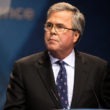GIVE ONE PRESIDENTIAL CANDIDATE CREDIT for identifying the problem and getting the policy right—and doing so before the twin government-sponsored enterprises (GSEs) Fannie Mae and Freddie Mac went into the tank in mid-July.
“For too long the Congress has played the role of an indulgent parent to the GSEs. . . . It is time for GSEs to give up ties to the federal government that have made them poster children for corporate welfare. Most of all, Congress needs to look more to the protection of the taxpayers, and less to the hyperbole of the GSE lobbyists that form a standing army on Capitol Hill.”
Ralph Nader made the above remarks before a House banking subcommittee in June. But it was June 2000. Eight years after Nader made his appeal to Congress, Fannie Mae and Freddie Mac came close to complete failure, threatening not only shareholders, who watched their stock lose half its value over the course of two weeks, but the U.S. economy, which the two mortgage giants are poised to drag deeper into recession. Because the two corporations bundle mortgages to sell to investors outside the U.S., the crisis poses a grave threat to the international banking system. The regulation Nader advocated never happened, and the American taxpayer is about to get a haircut.
The two corporations are so badly undercapitalized that the federal government can’t really bail them out. Together they currently hold between $80 and $90 billion. Capital reserves for their combined $6 trillion loan portfolio should be $400 billion. That’s almost two-thirds the cost of the Iraq War, money that won’t be found in the federal Treasury.
So Fannie Mae and Freddie Mac will be permitted to borrow at the Fed’s discount window. Congress will open up a $300 billion line of credit. The government will also buy stock in the two corporations. Enough of our tax dollars will be made available as a backstop so investors will be convinced that the stock of Fannie and Freddie is not going to tank, and their debt offerings will sell. In essence Congress, the Fed and the Treasury are flogging the corporations’ stock.
Former Treasury secretary Lawrence Summers nailed it in a June 18 interview on NPR. “If the companies make profit, it goes to the shareholders. . . . If the company’s not able to meet its obligation, then the government meets the obligation.” It is, Summers said, “the privatization of gain and the socialization of loss.”
How could two corporations created to promote home-ownership convince the Congress to ignore capital reserve requirements and other restrictions that are fundamental to sound banking? Consider the top-ten individual recipients’ share of the political contributions Freddie Mac distributed through June in the 2008 elections cycle:
Dodd, Christopher J. (D-CT): Senate $28,000
Clinton, Hillary (D-NY): Senate $17,600
Obama, Barack (D-IL): Senate $17,000
Alexander, Lamar (R-TN): Senate $9,000
Bennett, Robert F. (R-UT): Senate $8,999
Davis, Tom (R-VA): House $8,999
McCain, John (R-AZ): Senate $8,100
Boehner, John (R-OH): House $8,000
Pelosi, Nancy (D-CA): House $7,500
Reid, Harry (D-NV): Senate $7,500
This small sampling (courtesy of www.opensecrets.org) of six months’ funding suggests what the GSEs have been doing for the past twenty years. This year alone they have handed out $1.4 million.
Yet, the image of Treasury Secretary Henry Paulson standing on the steps of the Department of the Treasury on a recent Sunday, to announce stop-gap measures before the Asian markets opened, has at least focused the attention of Congress on reform. But what reform?
Robert Pollin is an economics professor at the University of Massachusetts at Amherst and a co-director of the Political Economic Research Institute. He argues for a return to something similar to the regulations in place until the 1970s, when free-market opponents of regulation dismantled the regulatory system that did for bank failure what the Salk Vaccine did for polio.
“The obvious answer is, if we’re going to have bailouts, which we do need to have to protect the innocent, we also have to return to something like the system of financial regulation that emerged out of the depression and basically continued into the seventies,” Pollin said. “[T]he principle of putting limits on speculative finance, putting limits on interest rates, of raising cash reserve requirements of all financial institutions, not just banks, these are speed bumps within the system. . . .
“Greenspan famously said during the stock market bubble runup, ‘Oh, I could stop the bubble in a minute. All I have to do is impose margin requirements. But I won’t do it. Because who am I to tell the market what to do. The market knows best.’ Of course, the market always knows best until they have a crisis,” Pollin said. “Then all of a sudden they need the government.”






0 Comments